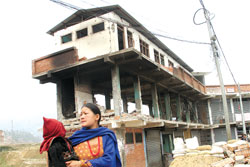 There was no warning. The people of Panauti were getting ready to go to bed when the explosions and gunfire started at 8.30 PM on the night of 5 February.
There was no warning. The people of Panauti were getting ready to go to bed when the explosions and gunfire started at 8.30 PM on the night of 5 February.Labourer Dharma Das Shrestha was returning home after a hard day's work when he was hit by a bullet. When he was found later that night he had bled to death barely 100 m from his house.
At Shrestha's house, family members had just finished dinner when they heard the first explosions. "At first we were not worried because dai usually came home late," recalls his sister-in-law Muna Shrestha. "But the fighting got worse, there was more gunfire and when he still didn't show up we started getting really worried. But we didn't dare go look for him."
Panauti residents are finally able to talk about that fearful night. Some say there must have been over 1,500 Maoists, most of them women, who swooped down on the town from the nearby hills. One unit cut off the road to Banepa, another positioned itself on the Kushadebi road to prevent the army base at Lakuri Bhanjyang from sending reinforcements and still another engaged the army base outside town.
In front of the Panauti municipality building the fighting lasted nearly all night, leaving five dead and 16 injured. At the time of the attack 25 police and army personnel were guarding the office building and they were pinned down, reinforcements from the army base ten minutes away arrived only at 2 AM. An army Mi-17 hovered overhead just before midnight, but eyewitnesses said Maoist rebels simply hid inside houses when the choppers appeared.
"When the guns started going off, we immediately shut our lights off, the children started crying, men and women started screaming, we were all looking for cover, some of us hid under the bed, some under the stairs, some behind the doors while others just put both their hands on their head and crouched in the corner," remembers Uddab Shrestha who is wearing a white mourning cap to mark his brother's death.
It is hard for Shrestha's grieving family to talk about their loss. Adults find it easier to describe the night-long clash but younger ones can't even talk about that. Uddab sits in front of the two-storey house he shares with 11 other family members and describes the horrific night. The family is poor, windows in his house have no glass, the backyard unkempt. "When the helicopters came the guns would stop for a while and as the sound of helicopters died down the guns would start again, we thought it would never end," Uddab recalls.
Two weeks after the clash, most of the two-storey municipal building is in ruins. Mounds of broken bricks lie in front and the metal shutters of the shop fronts are full of bullet holes.
Bhoj Raj Timilsina of the Kabhre office of human rights group INSEC says the Maoists had forced civilians to join them in their human wave attack on the village. "It was wrong to have used civilians like the way the Maoist did," he says. A recent report by the UN Office of the High Commissioner for Human Rights (OHCHR) condemned such attacks in areas heavily populated by civilians.
The Maoists also looted a number of shops. A pharmacy was forced to hand over antibiotics and painkillers and a grocery store owner says he lost his supply of instant noodles and food. Timilsina also found a case of extreme brutality. A sack of red chillies in the municipality building had been stolen from a store and poured over an injured unconscious soldier who was then set on fire and left to die.
"There were four of us playing under the bridge when there was a huge explosion," says Phulkaji Pradhan, 14. "The next thing I knew I was on the ground, my stomach was open and I could see my intestines coming out."
Pradhan was injured by a socket bomb the Maoists had planted under the bridge to Panauti to launch their attack. The blast also seriously injured Pradhan's friend Karsang Lama.
"I managed to put both my hands on my stomach and walked up to the road," added Pradhan from his bed in Scheer Memorial Hospital in Banepa. Lama was discharged on Saturday.
Pradhan lies with his hands on his stomach while his anxious mother sits next to him. It is hard to miss the helplessness and worry in her eyes. "I don't know who to ask for help. I have no money to pay for my son's treatment. Apart from Children Welfare Committee, Kabhre, which gave me Rs 500, no one else has offered to help," she says.
After the clash, Maoist district chief Lal Dhoj Lama issued a statement saying that the party regrets what happened to the boys and that the bombs were not targeted at children. That's no relief to Phulkaji and his mother.
"My stomach still hurts a lot," he says haltingly, "I am scared and weak and I don't know if I will ever be able to play like I used to."


